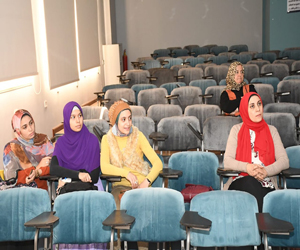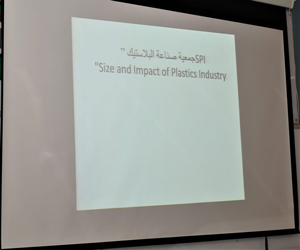The safe use of plastic... A lecture at the Faculty of Science
Under the auspices of Prof. Mahmoud El-Meteini, President of Ain Shams University, Prof. Ghada Farouk, Acting Vice President for Community Service and Environmental Development, Pro. Muhammad Ragaa Al-Satohi, Dean of the Faculty of Science at the university, under the supervision and presence of Prof. Amani Suleiman, Vice Dean for Community Service and Environmental Development, the Community Service and Environmental Development Sector at the College of Science organized on Wednesday, December 7, a lecture entitled "The Safe Use of Plastic".
Prof. Gamal El-Meligy, Professor of Polymers, Department of Chemistry, lectured at the symposium.
During the lecture, Prof. Dr. Gamal Al-Meligy said that there are common beliefs, including that plastic products can cause serious diseases such as cancer, infertility, and the deformation of fetuses. He added that some countries, such as Malaysia, have banned the use of plastic because it does not decompose, and throwing it into the sea causes the death of marine organisms, and some countries do not have places to bury plastic waste and do not pursue a recycling policy for this material, and therefore it may represent a dangerous environment in some of these countries.
Prof. Gamal El-Melegy explained to the audience what the numbers and letters symbolize in the English language, which is written on bottles, dishes, and plastic products in general. Exposure to the sun does not cause the release of any toxins as is rumored, and it is also easy to recycle. This material is made of transparent water or oil bottles and all kinds of soda bottles. It is a polymer that is not expensive and safe, but its problem lies in that this material absorbs some of the flavors of the liquid stored in it. Because the material from which the pot or bottle is made is highly porous, and also some types of bacteria may live in it, due to its porous nature. Exposing it to the sun may cause the material from which the bottle or container is made to become fragile.
The number 2 placed in a triangle also symbolizes the high-density polyethylene material, which is also a very safe plastic material, explaining that one of the characteristics of this material is that it is a high-density plastic that withstands pressures and harsh weather factors, so home chairs are made of this material.
PVC or polyvinyl chloride, which is symbolized by a number 3 in a triangle, is a safe plastic material if it is not heated to conditions of heat or erosion, pointing out that this polymer or plastic material is used in making water and sewage pipes and is also used on a very high scale in making floor and wall coverings and dining table linens.
During the lecture, Dr. Al-Meligyaddressed the plastic bags that are widely used among people, made of low-density polyethylene, which is a very safe plastic material for preserving food and drinks.
As for the symbol 5 inside a triangle, it symbolizes "polypropylene", which is a very safe plastic for storing food and is used in the manufacture of lunch boxes, colored spoons, and microwave containers.
As for No. 6 inside the triangle, it is “polystyrene” or “ps”, which is a plastic material whose chemical composition includes benzene, and “foam” food dishes are made from it, as well as “thermos” or heat-preserving containers for food and drinks, as it is considered a heat-insulating material, stressing that This substance is not used in hot food and drinks, because when exposed to heat or radiation, it disintegrates and may lead to food toxicity. The inner bodies of refrigerators are made of this substance.
The number 7 inside the triangle symbolizes polycarbonate, which is a very dangerous material that causes many diseases in humans if it is exposed to conditions of cracking or decomposition. Dr. Gamal Al-Meligy told the audience to avoid bottles with the symbol seven in the triangle written on them because they can cause toxic substances to be released into food and food if they are heated or exposed to radiation.
He advised mothers, in particular, to be careful in choosing a plastic milk bottle for infants, which could be made of types that may harm children.
 |
 |
 |
|


.svg)




